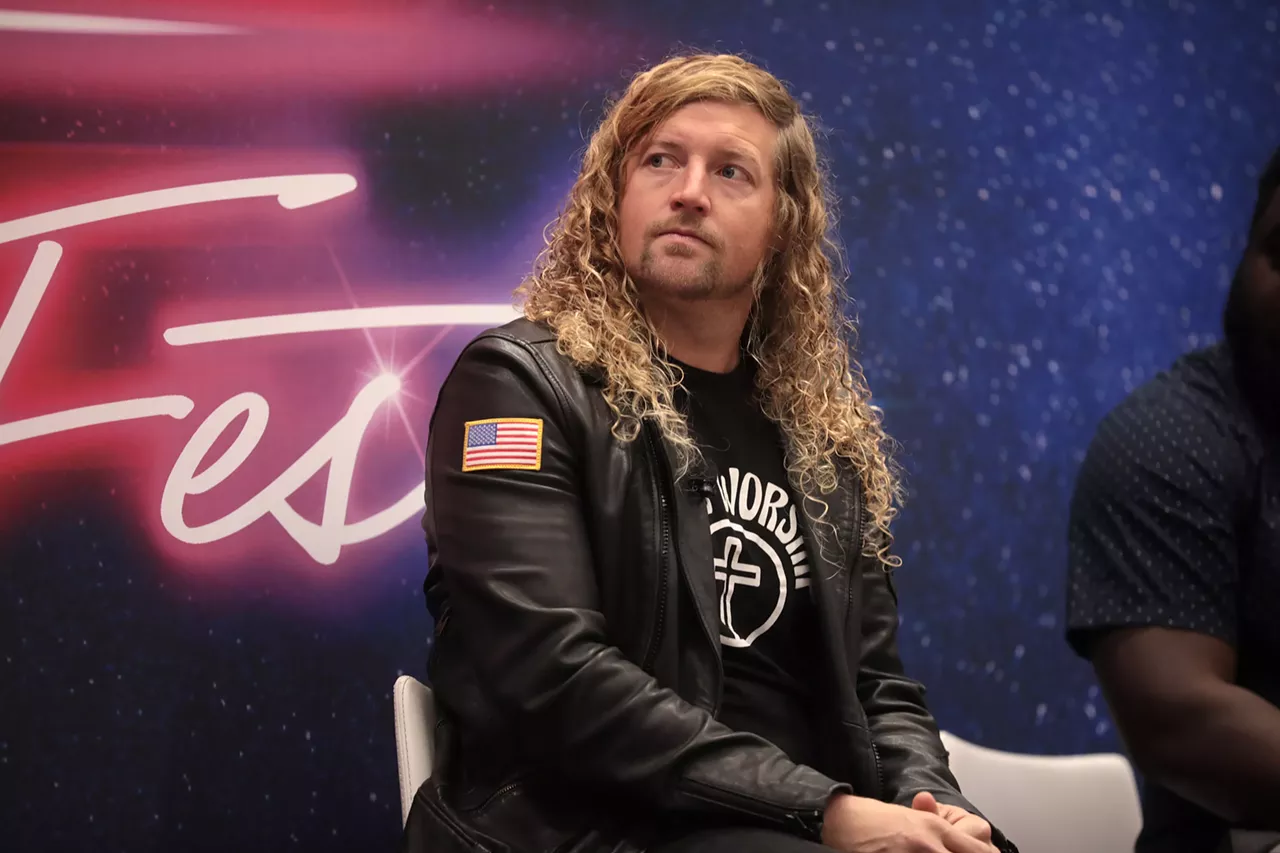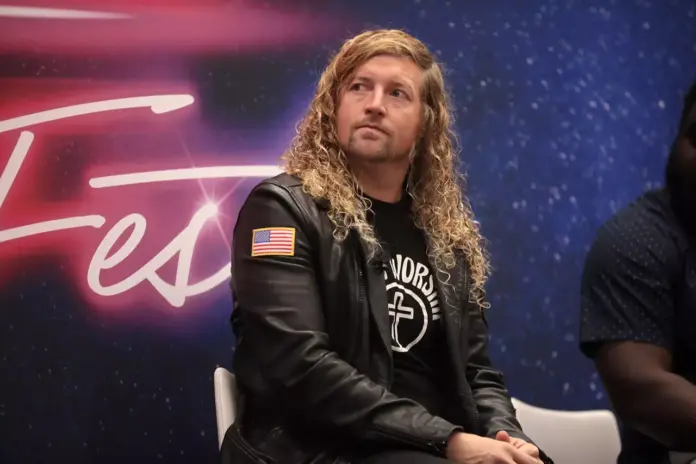This post was originally published on this site
Anti-queer Christian nationalists are coming back to Seattle this weekend. To counter the hate, Lavender Rights Project (LRP), a Seattle-based transgender rights group, is organizing its own event, “Louder Than Hate: Trans & Queer Joy as Resistance.” Fifteen community organizations, including the Church Council of Greater Seattle, the Seattle LGBTQ Commission, and the NAACP Alaska Oregon Washington State Area Conference, are standing with them.
Sean Feucht, a Christian nationalist celebrity, evangelical musician, and preacher who made his name touring the US and Canada to protest COVID restrictions, is coming to Seattle just three months after a provocative anti-trans Christian nationalist rally in Cal Anderson Park ended in the Seattle Police Department arresting 23 protesters, sometimes brutally. Feucht, who has called for a nation in which “Christians are making the laws” and who calls “transgenderism” “demonic,” originally planned to bring his “Revive in 25” rally, a tour of the nation’s “darkest, most broken cities,” to Cal Anderson on August 30. But after last-minute talks, the city convinced organizers to move the event to Gas Works Park.
Lavender Rights Project also planned to be in Cal Anderson, but moved the event to Washington Hall in the Central District for “safety reasons,” organizers say. Taking place at Washington Hall in the Central District on the same day and time as Feucht’s rally, “Louder Than Hate” will feature live performances from Black, Trans, and queer artists; offer food and music; include speeches from community organizers; and provide spaces for rest and celebration. Event organizers say moving the event indoors can help prevent any unpermitted events allied with Feucht from coming into contact with “Louder Than Hate” attendees and their supporters. Any clashes between these groups could be disseminated by Feucht-allied groups to support their claims that Christians’ freedoms of speech and religion are being attacked in Seattle—a content strategy Christian nationalist groups have used to effectively grow their influence across the country.
“We want to gather, to be in a place that feels like home, to love on each other, to celebrate all the things that make our beautiful community in Seattle unique, and to and to take time to learn more about the threat that Washington is facing in these coming years,” says Jaelynn Scott, LRP’s executive director.
The last major public appearance of Christian nationalist groups in Seattle—which featured local Christian nationalist pastors Jenny Donnelly, Matt Shea, and Russell Johnson and was organized by Mayday USA—ended with violence. The Seattle Police Department (SPD) pepper sprayed some zip-tied protesters before arresting them.
Mayor Bruce Harrell later denounced Mayday USA’s “far-right rally,” stating that the event was designed to “provoke a reaction by promoting beliefs that are inherently opposed to our city’s values.”
Groups tied to the worshippers threatened to sue and/or “hold to account” Mayor Bruce Harrell and the City of Seattle for allegedly violating their constitutional rights, inspiring another rally, “Rattle in Seattle,” outside City Hall—leading to police arresting more protesters as well as substantial right-wing and local media attention. Mayday USA announced Monday that it sued the city of Los Angeles for similar reasons.
Many Christian nationalist groups see controversy and conflict as an effective way to swell their ranks, says Jessica Johnson, an independent scholar who wrote a book about the rise and fall of Mars Hill, a Seattle-based network of megachurches that dissolved in 2015 following allegations of abuse against its co-founder and spiritual leader, Mark Driscoll.
Feucht’s movement effectively produces propaganda that complements positive depictions of movement members praying together with videos of clashes with counterprotesters, Johnson says. This social media strategy can make Christian viewers who are not part of Feucht’s movement “feel more compelled to join forces, and to really take these kinds of actions themselves into whatever spaces they are in … so that they feel compelled to be combative towards others,” she says.
LRP spokesperson Mataoe Aiden James Nevils says there’s a greater chance that an outdoor event would give groups associated with Feucht “the Fox News footage that they’re looking for,” and the “fight that they’re begging for.” Nevils says the organization moved the event indoors because they are concerned that Feucht may still hold an unpermitted march in Cal Anderson, despite the negotiations that moved his rally to Gas Works. After the city announced the change in venue, the event’s Facebook page showed a planned “Jesus March” at Cal Anderson at 3:30. It’s since been deleted.
Johnson noted that Mars Hill held a mass baptism at Gas Works during its heyday. She says both Driscoll’s and Feucht’s religious practices are attempts to “occupy” liberal cities. Citing Feucht’s use of members of the Proud Boys neo-fascist militia as bodyguards at a rally in Portland, Johnson says Feucht is both anti-LGBTQ as well as intentionally masculinist as a way to elicit violence and attention.
Much like Driscoll, who resigned from his leadership role at Mars Hill following accusations that he “bullied” dissenting members of his church, Feucht faces allegations of “spiritual, emotional, and psychological abuse” from former associates. Feucht has also been accused of embezzlement, and has been barred from holding rallies in eight cities in Canada, where some local governments labeled his activities as “hate speech.” Driscoll has rehabilitated his image since his downfall a decade ago, Johnson noted, saying that non-denominational groups led by a single figure lack structural forms of oversight, complicating attempts to hold figures like Driscoll and Feucht accountable.
Following the Mayday USA event, local community organizers, in conjunction with the city’s LGBTQ Commission, talked with the city about how to prevent violence when Christian nationalists come to town in the future, both from far right groups and the police that often protect them. After the last rally, Seattle Police Officers Guild President Mike Solan told local radio station KTTH that violence was the outcome of putting a “peaceful group” in “Antifa land, Cal Anderson Park.” He was referring to the Christian nationalists as peaceful. LRP’s Scott says the city consulted LRP and other groups on their approach to interacting with the city’s LGBTQ community.
“What [SPD] did was completely out of line: They pitted themselves against our community in protection of a religious extremist group,” Scott says, noting that LRP is “supportive of those who make a decision to engage in direct action.”

Direct action is clearly on the mind of whoever is putting up posters for the “WORLD’S LARGEST Kazoo Performance” of Chappell Roan’s “Pink Pony Club”—240 kazoos provided—during Feucht’s rally at Gas Works park.
Johnson, the scholar, added that Christian groups in attendance at events like “Louder Than Hate” should prioritize broadcasting their support via social media as a way to “counteract” what figures like Feucht frame as ‘correct’ Christian beliefs.
Tara Miller, co-Executive Director of the Church Council, a 106-year-old faith-rooted community organizing group in Seattle, says the Council has been sharing its social media strategy with LRP leading up to its event. They say the Council’s partnership with LRP is the outcome of reflecting on how to respond “when white Christian nationalists show up,” and reflecting on the visits of previous reactionary figures to Seattle, such as that of orange-juice-spokesperson-turned-anti-gay-rights-crusader Anita Bryant in the ’70s. They’ve been working with LRP on this event for six weeks.
“As we’ve been in conversation with Lavender Rights Project, they were asking, ‘How can you gather faith folks who can speak to this moment?’” Miller says.
They say the Council’s community plans to be with LRP “wherever the location is.”
LRP secured city funding for its “Louder Than Hate” event in collaboration with Dominique Stevens (an advisor to Mayor Harrell) and Councilmember Hollingsworth. The funding, granted through the Seattle Parks “Recreation for All” program, is exempt from the program’s typical requirement to be held in a park. “The event will still be eligible to receive the funds even if they move to a private location,” according to a spokesperson for Mayor Harrell’s office.
The Mayor’s office acknowledged the “Jesus March” that briefly appeared on the “Revive in 25” event’s Facebook page, but writes that organizers “have not submitted an application to hold a march in or around Cal Anderson Park.” The Mayor’s office says it is “not aware of a planned ‘Jesus March.’”
LRP isn’t taking chances. “We’re not going to bite the hook, and we don’t want to play into their game,” Scott says.


















